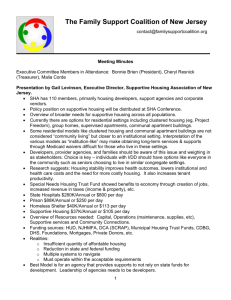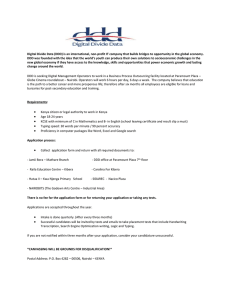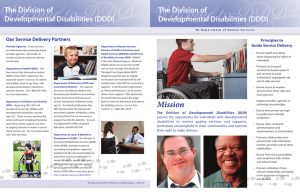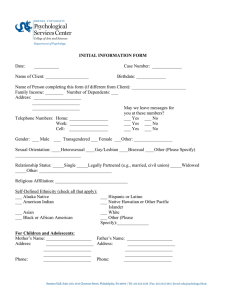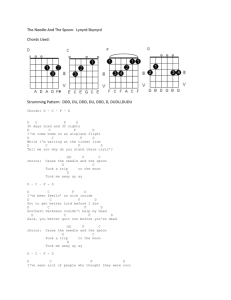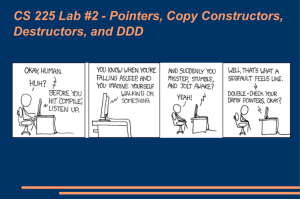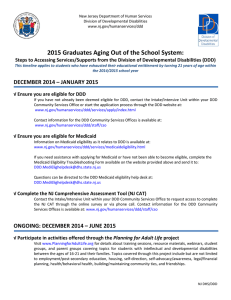Family Support Ser vices What are Who Can Request Family Support Services?
advertisement
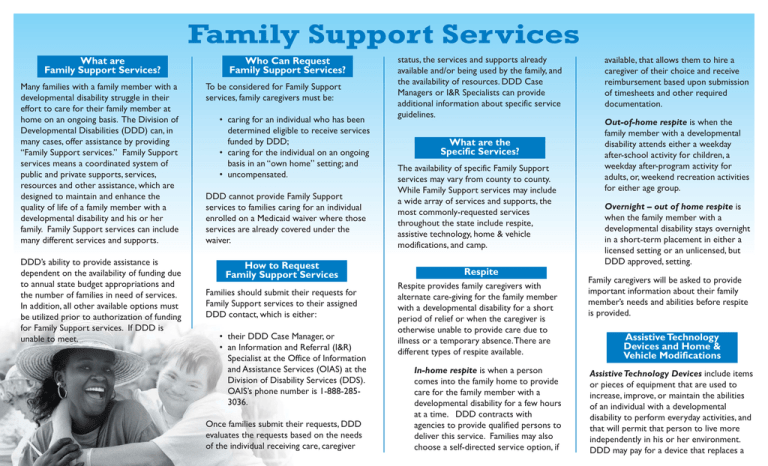
Family Support Services What are Family Support Services? Many families with a family member with a developmental disability struggle in their effort to care for their family member at home on an ongoing basis. The Division of Developmental Disabilities (DDD) can, in many cases, offer assistance by providing “Family Support services.” Family Support services means a coordinated system of public and private supports, services, resources and other assistance, which are designed to maintain and enhance the quality of life of a family member with a developmental disability and his or her family. Family Support services can include many different services and supports. DDD’s ability to provide assistance is dependent on the availability of funding due to annual state budget appropriations and the number of families in need of services. In addition, all other available options must be utilized prior to authorization of funding for Family Support services. If DDD is unable to meet. Who Can Request Family Support Services? To be considered for Family Support services, family caregivers must be: • caring for an individual who has been determined eligible to receive services funded by DDD; • caring for the individual on an ongoing basis in an “own home” setting; and • uncompensated. DDD cannot provide Family Support services to families caring for an individual enrolled on a Medicaid waiver where those services are already covered under the waiver. How to Request Family Support Services Families should submit their requests for Family Support services to their assigned DDD contact, which is either: • their DDD Case Manager, or • an Information and Referral (I&R) Specialist at the Office of Information and Assistance Services (OIAS) at the Division of Disability Services (DDS). OAIS’s phone number is 1-888-2853036. Once families submit their requests, DDD evaluates the requests based on the needs of the individual receiving care, caregiver status, the services and supports already available and/or being used by the family, and the availability of resources. DDD Case Managers or I&R Specialists can provide additional information about specific service guidelines. What are the Specific Services? The availability of specific Family Support services may vary from county to county. While Family Support services may include a wide array of services and supports, the most commonly-requested services throughout the state include respite, assistive technology, home & vehicle modifications, and camp. Respite Respite provides family caregivers with alternate care-giving for the family member with a developmental disability for a short period of relief or when the caregiver is otherwise unable to provide care due to illness or a temporary absence. There are different types of respite available. In-home respite is when a person comes into the family home to provide care for the family member with a developmental disability for a few hours at a time. DDD contracts with agencies to provide qualified persons to deliver this service. Families may also choose a self-directed service option, if available, that allows them to hire a caregiver of their choice and receive reimbursement based upon submission of timesheets and other required documentation. Out-of-home respite is when the family member with a developmental disability attends either a weekday after-school activity for children, a weekday after-program activity for adults, or, weekend recreation activities for either age group. Overnight – out of home respite is when the family member with a developmental disability stays overnight in a short-term placement in either a licensed setting or an unlicensed, but DDD approved, setting. Family caregivers will be asked to provide important information about their family member’s needs and abilities before respite is provided. Assistive Technology Devices and Home & Vehicle Modifications Assistive Technology Devices include items or pieces of equipment that are used to increase, improve, or maintain the abilities of an individual with a developmental disability to perform everyday activities, and that will permit that person to live more independently in his or her environment. DDD may pay for a device that replaces a life skill to perform a basic task of daily living that is normally expected to be performed based on a person's age, but not an item that is solely therapeutic, as individuals often can obtain therapeutic devices or interventions through medical insurance. If an item is necessary for a child’s education, the family may also be able to obtain it through the child’s school entitlement. Home & Vehicle Modifications include physical changes made in an individual’s home to items, appliances, or systems, and/or to a vehicle to allow the individual to function with greater independence. The changes must be directly related to the individual’s disability. Some examples are modifications to microwave ovens, the installation of ramps and grab-bars, the widening of doorways and modifications to a bathroom or to a vehicle’s steering controls. They also can include installing specialized electric and plumbing systems necessary to accommodate an individual’s medical equipment and supplies. Funding does not cover home improvements that are of general utility, which means that they benefit the household as opposed to benefiting the individual with a developmental disability specifically. For this reason, carpeting, roof repairs, installation of central air conditioning or any adaptation that adds to the total square footage of the home cannot be approved. Specific documentation is required, such as a description of how the item will benefit the family member with a developmental disability, a prescription, an insurance denial, and in some cases, competitive bids for the cost. DDD will provide guidance to a family on how to obtain the required documentation. Although insurance denials and doctor's prescriptions are required, they do not necessarily guarantee funding approval. DDD can also help arrange for an evaluation to help a family determine what type of item will work best. Camp Services Family Support can also assist families with some of the costs of day or overnight summer camps, as long as the camp has a contract with DDD or is on DDD’s list of “Qualified Providers.” There are some limitations to this: • Family Support funding cannot be used to pay for registration fees, transportation or the costs of day trips taken during camp. When families apply for Family Support for camp, they are required to submit documentation showing that the camp’s registration fee has been paid. • Families should be aware that camps may require full payment before DDD determines whether Family Support will be able to assist with any portion of the cost and the support received from DDD may not cover the full cost of the approved camp. In those cases, families will be responsible for paying the difference. • Families of children still in school must provide verification of extended school year services, or lack of same, as per the child’s Individualized Education Plan (IEP). Family Support Services Assistance for at-home caregivers of a family member with a developmental disability The application deadline for requesting assistance with camp fees is always the first Monday in May, and the actual date will be posted on DDD’s website each spring. Families are encouraged to apply early. Additional information about DDD funding for camp can be found on the Camp Services fact sheet, available at http://www. state.nj.us/humanservices/ddd/services/fss. For more information about DDD-funded Family Support Services, see: http://www. state.nj.us/humanservices/ddd/services/fss/, as well as Division Circular # 39 which is based on the Family Support Act of 1993, described in N.J.A.C. 10:46A. Division Circular # 39 can be found at http://www. state.nj.us/humanservices/ddd/news/ publications/divisioncirculars.html. Produced by DHS Office of Publications 12/2011 NJ Department of Human Services Division of Developmental Disabilities


